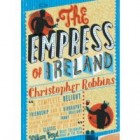Last year I read the wonderful MacRobertsonland, a rich biography of a once-renowned Melburnian chocolatier and entrepreneur whose name now only rings the scarcest of bells: his Willy Wonka-like empire has dwindled to a trio of chocolate bars and a high school named in his honour. In'The Empress of Ireland, a ripping novelesque biography of filmmaker Brian Desmond Hurst, I again found myself marvelling at how a larger-than-life, prolific individual might so quickly slump into the quicksand of history. In Macpherson Robertsons case, a lot had to do with the downhill tumble of his business empire in his later years, while in Hursts it seems more to do with the unevenness of his filmmaking and the fairly limited release of his films.
I wasnt at all familiar with Hurst when I picked up this delightful memoir, an account by author Christopher Robbins, in his twenties during the time at which this is set, of Robbins and Hursts bizarre Odd Couple-type relationship as they work together to write a film about the lead-up to the birth of Jesus Christ. If that sounds zany and gonzo, thats this book for you: its ribald and scandalous, a veritable library of Babel of witty repartee and pithy epigrams that would put Oscar Wilde to shame, and its a pure joy to read.
When the two first meet, Robbins is a hack freelancer looking to pay the bills, while Hurst is an eccentric 80-something whose daily indulgences include champagne breakfasts, varied indiscretions with just about any young lad in a military uniform, and instances of utter magnanimity towards strangers (nevermind that he cant actually afford to pay the milkman). Robbins is tasked with writing a screenplay, and the two become unlikely friends as they gad about to Morocco, Ireland, and Malta, chasing mischief, booze, and gossip. We can only be thankful that Robbins was diligent with his note-taking after all those gimlets, because on just about every page of this book theres a delicious anecdote or quotably grandiloquent remarkit would be a terrible thing to have lost these.
Take this, on Hursts disinclination to save money, preferring to give it away or spend it on frivolities:
Dont be like me, Christopher. Thirty-six years old before I owned by first coachbuilt Rolls Royce what a bore!
The wolf, I announced in a tone intended to convey dreadful potent, is at the door.
My advice -'dont let the bugger in!
Or the fact that Hurst, despite his shamelessly hack nature, is a bibliophile whose bible is'Finnegans Wake:
Agatha Christie and Ian Fleming in paperback and the complete works of Bulwer Lytton, as if anyone cared. Books by the yard. Thats what it is,'books by the yard. And not even leather-bound. I am disgraced but its an impossible thing in this day and age, when the world is ruled by men of business, to be given money for a few decent books. The guests are condemned to watch the television, terrible though it is.
(This scene continues on to rather resemble the delightful bookish grilling of Holly Martins seen in Carol Reeds'The Third Man, which I highly recommend you watch.)
Then theres Hursts weird blend of egalitarianism and condescension: he seems to have met just about everyone worth knowing (and has a story about each of them as well), and is flabbergasted when the Prime Minister of Malta doesnt have time to meet him:
Extraordinary! The Archbishop has the grace to see us immediately, as do the Knights, but nobody is'too busy!'How can he be? Its not a very'big island.
Or his screed on wine snobs:
Christopher, although I abhor wine snobs, and all their mouth-swishing and snorting rituals and fatuous jabbering of raspberry jam, sandalwood and old leather, as they vainly try to fix the ethereal and spiritual experience of fleeting taste with demented jargon I do take exception to blimey. Although no doubt conveying sincere appreciation, it is not equal to the occasion. An eyebrow raised an inch or so would be sufficient to signal appreciation to a fellow epicurean.
But although Hurst never rests on his oracular laurels, theres more to him than brilliant one-liners. Our knowledge of Hurst slowly grows as Robbins learns more about his new acquaintance, and our impressions of the freewheeling octogenarian become more nuanced and layered. Although Robbins initially believes Hurst to be a man of contradictions, he grows to see the underlying thread of Hursts convictions; moreover, though Hurst presents himself as a carefree member of the upper class, this image begins to crack as we learn about his difficult childhood and his horrific experiences on the frontlines of Gallipoli.
Sadly, Hurst is slowly lost to dementia before finally passing away, but the book closes out with a wonderful scene of his love for James Joyce, which Ill quote (and hope that I dont get slugged for copyright reasons):
That is your studied opinion [of'Finnegan's Wake], is it? That is your penetrating insight and considered intellectual assessment of one of the great books to have been produced by one of the greatest literary geniuses ever to have come from a race of great literary geniuses?'A load of bollocks?
To which Robbins responds by decrying Ulysses as unreadable, and after which Hurst is quiet before adding:
You are'wrong. Ignorantly, unimaginatively, enormously, Anglo-Saxonly'wrong! Finnegans Wake is music. It is song and laughter. It is enormously witty and madly clever. It is a great Irish writers ecstatic expression fo joy in the use of language. It is the endless dream of Ireland all her history. A book for angels.
Though'The Empress of Ireland'is more a book for devils, its a sheer delight, and if youre after a wonderful narrative portrait of a curious figure, I highly recommend it.
Rating: 



 (superb)
(superb)
Support Read in a Single Sitting by purchasing'The Empress of Ireland'using one of the affiliate links below:
Amazon'|'Book Depository UK'|'Book Depository USA'|'Booktopia
or support your'local independent.
Other books by Christopher Robbins:













